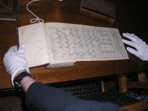The Chemical Heritage Foundation (CHF), Philadelphia, US, has acquired a priceless collection of textbooks chronicling the past 600 years of chemistry.
The Chemical Heritage Foundation (CHF), Philadelphia, US, has acquired a priceless collection of textbooks chronicling the past 600 years of chemistry. Until recently, the unlikely location for this collection was the basement of the house of Roy Neville, a 77 year old retired chemical engineer from California, US. Neville has spent the past 60 years gathering his remarkable collection, which the CHF purchased for $10m (?5.6m).

Neville began collecting ancient books as an 18 year old in Bournemouth, UK, and his passion for science books developed after relocating to the US to undertake a PhD in physical organic chemistry. It was 1954 and the tercentenary of the publication of Robert Boyle’s Skeptical Chymist from 1661 (the text in which Boyle first introduced the term element) was looming. Already a keen bibliophile, Neville decided that he had ’better stock up on Robert Boyle’. And from there the collection grew until ’it occupied a room about 30 feet by 20 feet plus two other rooms stacked from floor to ceiling’.
When the time came to hang up his cotton gloves, the CHF was the very happy recipient of an offer to purchase the collection from Neville. Thanks to a donation from Betty and Gordon Moore and the Gordon Cain Foundation, they were able to scoop the sale of the century. Principe, greatly excited about the collection said that the purchase was ’a bargain’ and added ’what is here is beyond price’.
Not only does the collection contain rare editions of books by Boyle (only 35 editions of Skeptical Chymist exist in total), Newton (Neville prides himself on his ’collection within a collection’ of Newton’s works), Lavoisier, Marquer and a perfect copy of Mendeleev’s text book laying out the periodic table of the elements to name but a few, there are other rare finds in the collection. Described by Neville as ’hardly a book, more like a pamphlet’ the collection includes Mendeleev’s Masters thesis, as well as off-prints, signed by the author, of Humphrey Davy’s works.
Principe is intrigued by the questions that such rare finds throw up and is relishing the chance to find the answers. For instance, does the inclusion of a Roger Bacon book owned by Henry Cavendish prove that Cavendish had an interest in alchemy? Does the discovery of a handwritten manuscript by Newton prove that he knew as much, if not more, than Boyle about a recipe for the elusive Philosopher’s Stone? Neville stipulated in the terms of the sale that the books must stay together, ensuring the collection remains an invaluable research resource.
Principe concluded the library’s opening celebrations with the wish that ’they locked me in the vault with the books overnight and I could sit and read them’.
Katharine Sanderson






No comments yet